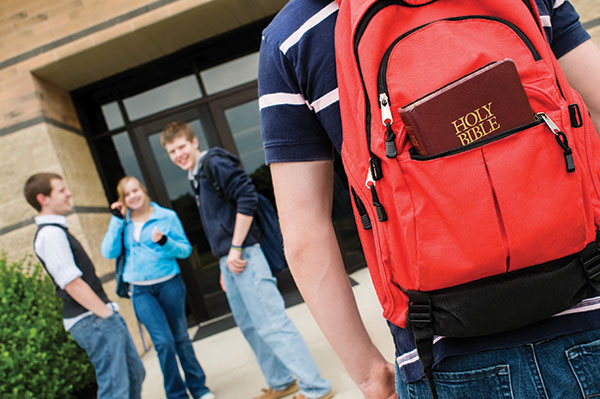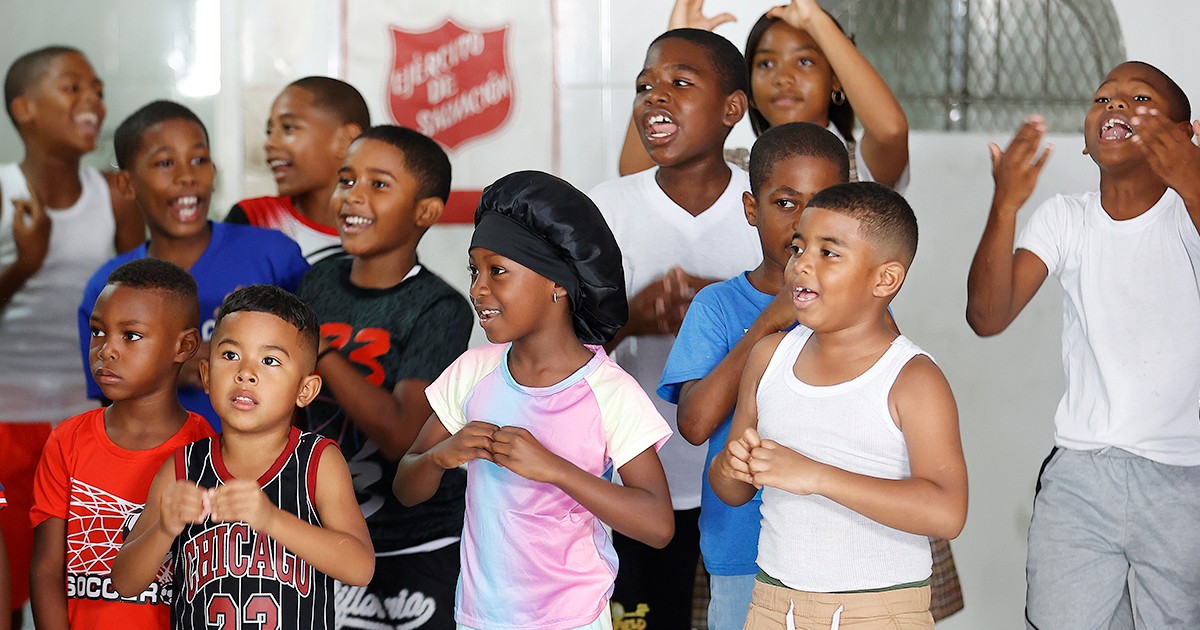
Which is better, a Christian or public school? This question has been debated in many Christian homes with the desire to raise children who are knowledgeable and well-balanced disciples of Christ. The answer seems obvious: choose God over the world. But since the experiences can differ from school to school, you should carefully explore the benefits and challenges that both systems offer for your family.
Christian Worldview
The benefits of a Christian school seem obvious at first. Your child has the opportunity to learn about God in an environment where all subjects and events are held up to their relevance to the Bible. Makes sense, right? Well, there are those who feel that Christian schools shelter children from the real world. In my experience, this fear is a myth. For the most part, children in Christian schools watch the same TV programs as public school kids, enjoy the same YouTube videos, read the same books and eat the same things for breakfast. In fact, there are many non-Christian families who send their children to Christian schools because they are private schools that foster good morals and work ethic. Not all kids at Christian schools are professing Christians or fully appreciate the Bible. The main difference is that Christian schools don't have their hands tied when it comes to unashamedly rendering the message of the gospel.
One drawback is that a Christian school environment, like any private school, costs money. Many Christian school families sacrifice vacations, larger homes and extra-curricular activities to pay for their kids' education. However, some Christian schools offer reduced tuition with each successive child you enrol. The more children you have, the less it costs for each additional child. As well, some give fee reductions when parents do a specified amount of volunteer work in the school. Nonetheless, there is a financial cost. This is a significant contrast to the public school system, which doesn't cost you more than what you already pay on your property tax. That's the stinger—as a Christian school parent, you pay for both school systems.
Money is also a relevant factor when you look at the costs of running a school. The local elementary school at the end of your street draws on funds from a larger entity—your school board—which draws on government funds. While there is always the potential for program cuts, generally the school board provides your child with everything that is essential to the curriculum and even extras such as sports teams, musicals and clubs. Public schools are now moving toward taking ownership of supplying things such as pencils, books and even instrument mouthpieces—with the goal of cutting down on extra fees for families.
Christian schools, historically, have not had the additional funds to offer the same activities found in public schools. Many have relied on fundraising and increasing fees to grow numerically and expand programming. In recent years, however, Christian schools have seen expansion of buildings and programs thanks to effective fundraising campaigns.
Diverse Curriculum
It would be trivial to say that money is the main separation between the two school systems. Curriculum is another key factor. The public school curriculum is frequently reviewed—some would argue that it gets changed too often. The curriculum is standardized across the province, but there is wide latitude for teachers to choose different ways of presenting the curriculum. Teachers can generally choose the textbooks, novels, poetry—and fit them into the framework of the curriculum. Teachers are required to use a diverse teaching style that meets the needs of all learners, and a single school day may vary from teacher-centred learning, teacher-assisted learning, group learning and individual-focused learning. Teachers are to differentiate.
Many Christian schools now use the provincial curriculum, especially if they are a part of a Christian association of schools, and operate their learning much like the public system. This makes it easier for your child to transition to a public system if necessary. Some Christian schools in Canada, however, use American curriculum. This means the content in mathematics is not in metric, the language uses American spelling and terms, and the history is American (though most don't restrict themselves to American content). Also, this curriculum is often designed to one type of learning, that of learning by rote—repeating, repeating, repeating, until it is learned. Some prefer this style of learning, while others find it non-engaging. In this environment, students sit in straight rows, and the focus is mainly on the teacher and the textbook. With this style, many schools are not able to engage or meet the needs of all learners and they end up with discipline problems, or losing students to other schools. When looking at a Christian school, you should find out whether the teachers have flexibility in content choice or teaching style.
Standards of Excellence
There are occasionally differences in educational standards. Public schools follow plans for continuous improvement and question how they can do things better at staff meetings and board discussions. There are standards of excellence that are set and teachers are required to follow guidelines around personal conduct. This often relates to discipline—the things teachers are allowed to do or not. Also, teachers are to follow a standardized homework policy, detailing approximately how much time should be spent on homework daily. Most importantly, the public constantly evaluates methods of assessment and these become standardized.
Many Christian schools are on par with the public schools in this regard. Once again, those that belong to an association are able to draw on resources for better learning and are held accountable on many fronts, as in the public system. Unlike a school board, which standardizes its schools, there are a number of Christian school associations and some have different levels of compliance for membership. When looking at a Christian school, find out which association the school belongs to and research its educational standards.
Some Christian schools are not part of an association. Assessment varies from teacher to teacher. Some teachers give out hours of homework per night, while others may give little. Some of these schools cannot afford to hire certified teachers and the result can often be a teacher struggling to teach curriculum while maintaining discipline, as well as frustrated students and parents. In searching for a Christian school, you would do better to find one within a Christian school association or probe the school on these issues.
Positive Influences
Some teachers in the public school are great to work with and some are challenging. Likewise, some teachers in the Christian school are great to work with and some are challenging. As Christian school parents, however, you would have prayers being lifted up for your child to God by his or her teacher. During times of crisis or celebration, you can be supported by an entire Christian school community. While the public school system doesn't have an explicit faith component, don't discount that there are many Christian teachers, principals, secretaries and caretakers in the public system praying for students and who capitalize on ways to share their faith. In addition, there are teachers outside of the Christian faith who show Christlike qualities as they demonstrate love and try to bring out the best in your child. Some Christian parents even start neighbourhood prayer groups. Is Jesus in the public schools? He certainly is!
Lastly, there is the school environment. Most notable is that in the public school, your child will, almost daily, hear coarse language and be exposed to worldly values and lifestyles that are contrary to the Bible. This occurs in Christian schools, too, but I would have to say it is softened to a degree where you definitely see a noticeable difference and the schools can address behaviour using the Bible as a moral standard.
There are other notable differences which fall in the area of personal preferences. With the public school, children wear whatever they want within a relaxed dress code. The location is the school nearest you—bussing is provided if you don't live close enough. You can choose between regular stream, Catholic and French immersion. When researching a Christian school, determine if there are uniforms and decide how you feel about them. Also, determine whether the distance from your home is feasible as a long-term arrangement. Will your children have to go to before- and after-school care? Will your children be close enough to get together with friends from school during evenings or weekends?
Know Your Child
There is much to consider in making a choice between Christian and public schools. If you are leaning toward public school, make sure your children are connected to other Christian youth and regular worship. If you think a Christian school is where you should send your children, look into costs, curriculum, standards and the other considerations mentioned, while researching the Christian school association, if any.
The question then is not, “Which system is better?” but “Which is better for you?” as you prayerfully consider your choices. Most importantly, whichever system you choose, don't leave your child's faith up to your school. Don't forget your calling as a Christian parent to help foster your child's faith in your own home. It is your responsibility as a parent to “start children off on the way they should go” (Proverbs 22:6).
Salvationist Steve Pavey is currently a parent of children in the public school system, was a Christian school parent for eight years and has been teaching in the public school elementary system for 11 years. He is a member of Richmond Hill Community Church, Ont.










Leave a Comment